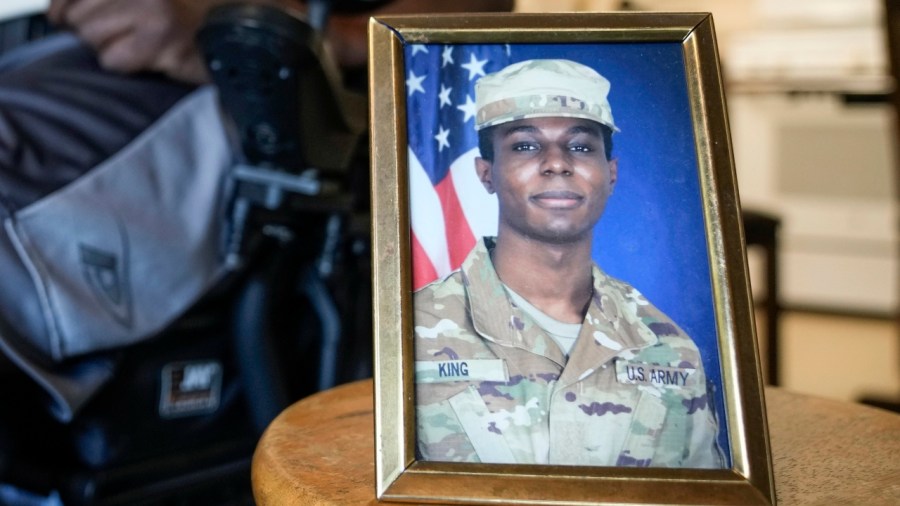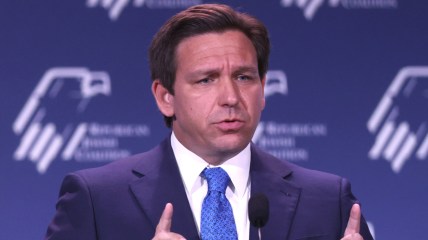North Korea asserts US soldier Travis King crossed border after becoming disillusioned with America
It was North Korea’s first confirmation of detention of Pvt. Travis King, who sprinted into the North while on a civilian tour of a border village on July 18.
SEOUL, South Korea (AP) — North Korea asserted Wednesday that a U.S. soldier who bolted across the heavily armed Korean border last month did so after becoming disillusioned with the inequality of American society and racial discrimination in its Army.
It was North Korea’s first official confirmation of detention of Pvt. Travis King, who had served in South Korea and sprinted into the North while on a civilian tour of a border village on July 18. He became the first American confirmed to be detained in the North in nearly five years.
The official Korean Central News Agency, citing an investigation by relevant North Korean authorities, reported that King told them he decided to enter North Korea because he “harbored ill feelings against inhuman mistreatment and racial discrimination within the U.S. Army.”

The report said King also expressed his willingness to seek refuge in North Korea or a third country, saying he “was disillusioned at the unequal American society.”
KCNA is a propaganda outlet and its content is carefully calibrated to reflect North Korea’s official line that the United States is an evil adversary.
The report said North Korea’s investigation into King’s “illegal” entry would continue. Verifying the authenticity of the comments attributed to King in North Korea’s state media is impossible.
The United States, South Korea and others have accused North Korea of using foreign detainees to wrest diplomatic concessions. Some foreign detainees have said after their releases that their declarations of guilt while in North Korean custody were made under coercion.
A U.S. Defense Department official, speaking on condition of anonymity because of the sensitivity of the matter, said the U.S. had no way to verify North Korea’s claims about King. The official said the Pentagon was working through all available channels to bring King back to the U.S.
“This is 100% North Korean propaganda in its element. King, as an American citizen held in North Korea, has no sway in how (North Korea) chooses to cast its narrative,” said Soo Kim, an expert with Virginia-based consultancy LMI and a former CIA analyst.
“As for King’s release, his fate rests in North Korea’s hands. Perhaps the regime will try to ‘bargain’ King’s life in exchange for financial concessions from the U.S. More than likely, negotiations won’t be easy, and terms will be dictated by Pyongyang,” she said.
The soldier’s family said his mother, Claudine Gates, is appealing to North Korea to treat her son humanely.
“She’s a mom worried about her son and would be grateful for a phone call from him,” family spokesman Jonathan Franks said in the statement. “Lastly, she has been in touch with the Army this evening and appreciates a (Defense Department) statement that it remains focused on bringing Travis home.”
Tae Yongho, who was a minister at the North Korean Embassy in London before his defection in 2016, speculated North Korea might release King eventually because it didn’t immediately express its intentions of accepting King as refugee in the North and spoke about a third country resettlement. Tae, now a lawmaker in South Korea, also cited North Korea’s description of King as an illegal entrant, rather than someone who “voluntarily” entered the North.
Tae earlier said North Korea would be reluctant to hold a low-ranked solider like King for long because he won’t provide it with high-profile U.S. intelligence and would require high costs and resources to manage his life.
Some analysts have said North Korea might try to tie King’s release to the U.S. cutting back its military activities with South Korea, amid heightened animosities between the wartime foes.
North Korea has conducted more than 100 weapons tests since the beginning of last year, many of them in the name of issuing warnings over the expansion of U.S.-South Korean military drills that it views as an invasion rehearsal. Next Monday, the allies are to begin major annual drills, which North Korea views as an invasion rehearsal.
The leaders of the U.S., South Korea and Japan are also expected to announce plans for expanded military cooperation on ballistic missile defense in the face of North Korea’s evolving nuclear threats when they meet for a trilateral summit at Camp David on Friday, according to U.S. officials.
On Tuesday, North Korea slammed U.S.-led plans for an open U.N. Security Council meeting on its human rights record as “despicable” and only aimed at achieving Washington’s geopolitical ambitions.
North Korean Vice Foreign Minister Kim Son Gyong said the council must first deal with the American human rights issue, calling the United States a depraved “empire of evils.” In a statement carried by state media, Kim accused the U.S. of fostering racial discrimination, gun-related crimes, child maltreatment and forced labor.
King, 23, was among about 28,000 U.S. troops stationed in South Korea as deterrence against potential aggression from North Korea. At the time he joined the civilian tour and crossed the border, he was supposed to be heading to Fort Bliss, Texas, following his release from prison in South Korea on an assault conviction.
U.S. officials say he has been declared AWOL, which can be punished by confinement in the brig, forfeiture of pay or dishonorable discharge with the severity based on their time away and whether they were apprehended or returned on their own.
The U.S. and North Korea, which fought during the 1950-53 Korean War, are still technically at war since that conflict ended in a truce, not a peace treaty. They have no diplomatic ties and Sweden provided consular services for Americans in past cases, though Swedish diplomats reportedly have not returned to North Korea since the beginning of the COVID-19 pandemic.
TheGrio is FREE on your TV via Apple TV, Amazon Fire, Roku and Android TV. Also, please download theGrio mobile apps today!




